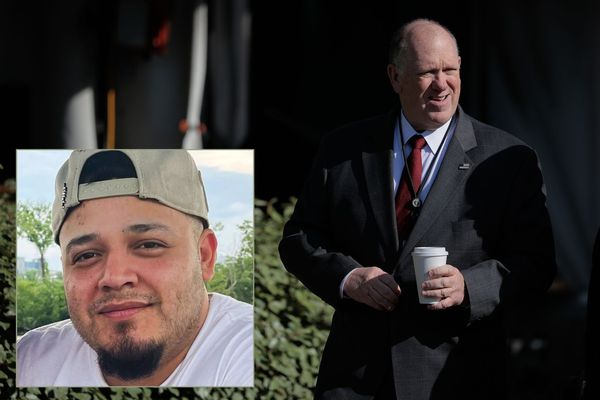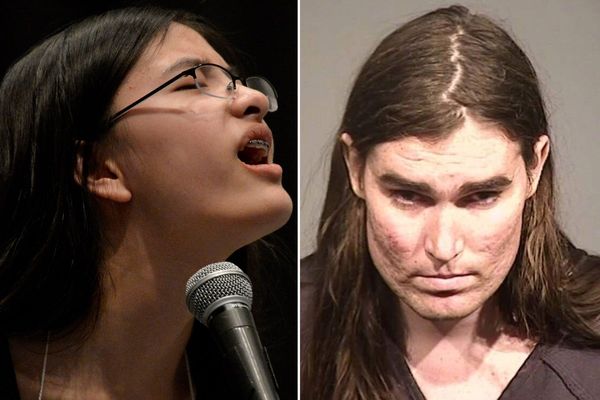
Hannah Gadsby would like to set one thing straight: nearly six years after the viral success of Nanette, they’re still getting their head around how that breakthrough moment reshaped their world.
“I feel fine, I’m OK, but I would like to go on record as saying, ‘I don’t know exactly what I’m doing or why,’” the 46-year-old deadpans. “The world I am in now is simply not the same as the world that I’ve worked slowly and laboriously for over 40 years to understand. And now I’m just a fucking babe in the woods again.”
Nanette was already an awards-scooping live show before Netflix’s cameras started rolling, but its meteoric success made a proper international celebrity of the festival circuit staple. It also made Gadsby, who grew up in a small town in north-west Tasmania, an unexpected figurehead for LGBTQ+ representation in Hollywood.
This hasn’t always been their cup of tea. In October 2021 they wrote and shared an open letter addressed to Ted Sarandos, after the Netflix CEO namedropped them while defending the streaming giant’s platforming of Dave Chappelle’s 2021 special The Closer. The special, which included jokes targeting trans people, provoked outcry among the LGBTQ+ community and a staff walkout at Netflix.
In their note, Gadsby pointed to the “real-world consequences of the hate-speech dog whistling [Netflix] refuse to acknowledge”.
“It was a very particular moment, and I was mindful that just speaking in opposition to things doesn’t get anywhere,” Gadsby explains now. “We all know this, and yet we can’t help it.”
Gadsby spends much of their time based in Australia but has seen trans rights become a divisive political issue in the US and UK, one often divorced from the voices and experiences of trans and genderqueer people.
“It’s just part of the broader culture wars – trans people are being held up as this wedge issue. It’s happened before, we know it’s wrong. We always feel regret, culturally, after these moments – ‘Oh we were a bit harsh there weren’t we?’ But these moral panics exist in a time of great uncertainty, which it is, and certain groups of individuals cop it. And that’s what’s happening, and that makes it very dangerous. And Australia isn’t immune.”
The result is Gadsby’s fourth Netflix special, an exercise in sharing the microphone called Hannah Gadsby’s Gender Agenda. Filmed in London last October, the show features seven comedians each with different experiences of gender, sexuality and, importantly, how to get laughs.
“I really thought, ‘Well, I do have a little bit more power. I need to learn how to use that’,” they say. “This was my best guess at how to create something that is a constructive part of this conversation, instead of circling the drain of transphobia [where] non-genderqueer performers have set the tone of the conversation. No one wins in that conversation.”
Gadsby’s opening monologue speaks pragmatically about the impact of a show they describe as a “carbon offset” in Netflix’s broader relationship with LGBTQ+ audiences. (“You don’t raze the Amazon and then plant a tree,” they joke.)
“I wanted to give a platform to comedians who are working the coalface, on the ground,” Gadsby says. “I don’t number amongst them. Success offers you an elevation out of the scrum, so while I’m busy touring the world, I don’t have to deal with those backstage areas, or trying to find safe spaces onstage. I wanted to help a diversity of voices, so this was my best guess.”
In March, Gadsby will return to Australian stages with a new live show titled Woof!, an experience they hope will help them reconnect with the grassroots immediacy of standup.
“Standup comedy remains one of the most accessible art forms. Standup has always been a place where we’re not relying on gatekeepers and influential connections,” they say. “For something that seems so simple, it offers up such a diversity of possibilities. And I think queer people are really great individuals to populate that space. That’s why you have these communities popping up in Brooklyn, LA and London. But I don’t come from those worlds, I come from isolated spaces.”
This, Gadsby says, is why Netflix – for all its flaws – remains an important platform: “We need to show people who don’t live in those environments, within our community, people who live in isolated corners of the world, but have access to Netflix. That felt like an important part of the equation.”
Gadsby might not be at the coalface of standup, but recent projects haven’t been without heat. The Brooklyn Museum’s 2023 exhibition It’s Pablo-matic: Picasso According to Hannah Gadsby, a quippy rebuke of the famous cubist whom Gadsby critiqued in Nanette, was savaged by many critics – from the New York Times to the Sydney Morning Herald.
In this case, at least, Gadsby harbours no uncertainty. “I knew what I was doing,” they say of the show’s negative reviews – which they ignored. “I knew I was stirring this pot, so why would I stick around for shit that I knew that I was starting? I did that, I created that circus. I don’t need to watch it.
“I start conversations, I don’t have to lead them, I don’t have to win them. That’s not what I’m in the business of. I just see a stagnant pool, and I go ‘That needs stirring’. Job done.”
The loud and polarised online chatter that comes afterwards is part of the reason Gadsby is looking forward to returning to standup.
“That’s what the algorithms are geared toward: grift and cruelty,” they say.
“That’s why I like the live performance space – you really are accountable to a lot of people at once.”
Hannah Gadsby’s Gender Agenda starts on Netflix on 5 March. Their live show Woof! is on at the Roslyn Packer theatre in Sydney from 7-17 March, and then at Melbourne international comedy festival from 28 March to 20 April







